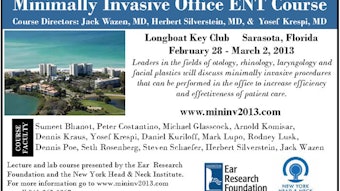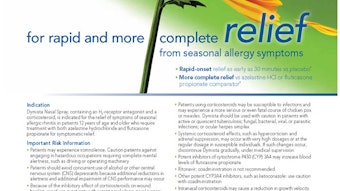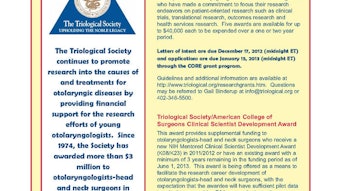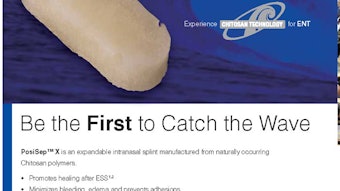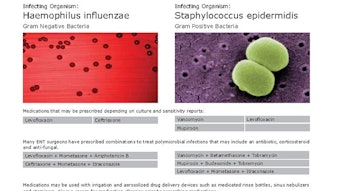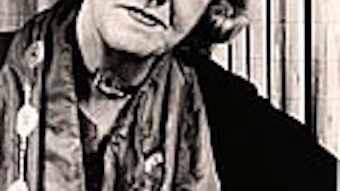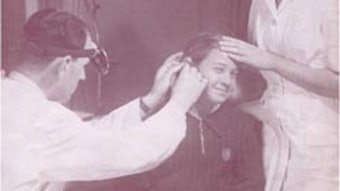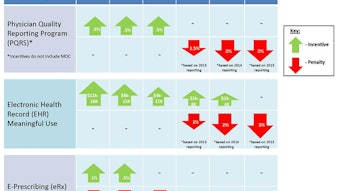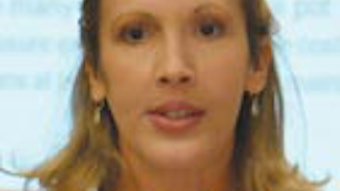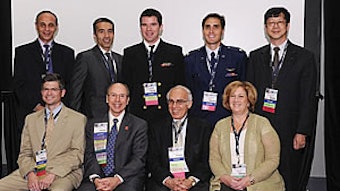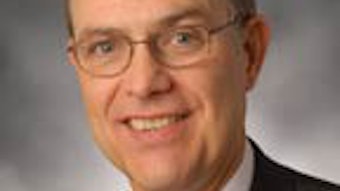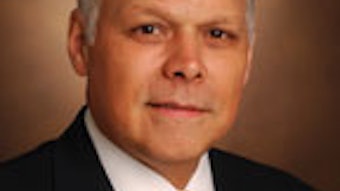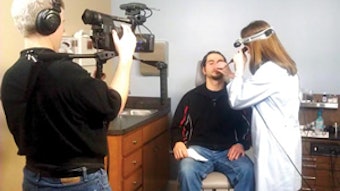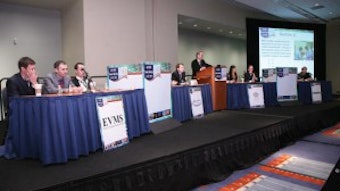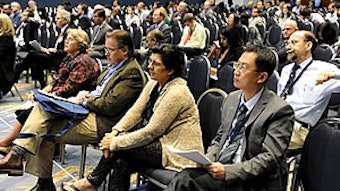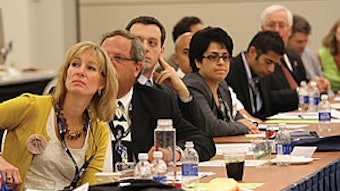Global ENT Outreach Mission Trip: Phnom Penh, Cambodia
Anthony G. Del Signore, MD, Mount Sinai School of Medicine, Resident Travel Grantee Ian M. Humphreys, DO, Michigan State University/Detroit Medical Center, Resident Travel Grantee In July, we joined a medical missions trip led by Global ENT Outreach to Phnom Penh, Cambodia. This was the largest volunteer group to date for our host organization and included the following team members: Shaheen M. Counts, MD; Anthony G. Del Signore, MD; Ian M. Humphreys, DO; Marta Sandoval, MD; Richard Wagner, MD; and Charles Z. Weingarten, MD. We feel the experiences afforded to us by the AAO-HNSF Humanitarian Travel Grant were truly remarkable. After nearly 20 hours of travel we reached the Cambodian capital of Phnom Penh. Our team of surgeons, nurses, medical students, and public health educators met for the first time in a tiny hotel. Our nationalities, ethnicities, and languages were diverse, but we shared a unified vision of providing otologic care and training to these people in need. Only 30 years prior, an act of unspeakable genocide targeted the educated and professionals in this area; an entire generation of physicians, health educators, and nurses were eradicated. Today, a fractured healthcare system with poor infrastructure, limited resources, and inexperienced health professionals exists. Rehabilitative efforts, including a nascent otolaryngology residency-training program at the National Hospital Preah Ang Duong, are underway. However, otologic care in particular is poorly understood and under delivered. The week began with a dedicated otologic clinic to further evaluate patients initially screened by Cambodian otolaryngologists. Many patients traveled great distances from the surrounding countryside to obtain long awaited care. In total, 120 patients were evaluated using either a teaching microscope or video endoscope. Forty-five surgeries were scheduled subsequently for the remainder of the week. We saw a diverse spectrum of pathology, and patients including congenital malformations, chronic otorrhea, tympanic membrane perforations, cholesteatoma, and otosclerosis. Accordingly, surgical interventions focused on the management of chronic ear disease, with tympanoplasty and tympanomastoidectomy being the most frequent surgical procedures. One goal reigned supreme: to create a dry, safe ear. Given the lack of readily available inhalational anesthesia, the majority of the procedures were performed under local anesthesia and intravenous sedation. All patients were admitted for overnight observation and subsequently discharged home with follow-up care to be provided by the Cambodian otolaryngologists. Both in the clinic and operating room we had frequent opportunities to teach evaluative and diagnostic strategies, as well as surgical techniques. Despite obvious cultural and language barriers, we focused our collective efforts to achieve our mission. In the end, we provided high quality demonstrative surgery and instruction that serves as a model for continued development of the Cambodian otolaryngology training program. Not only did we gain an appreciation for the difficulty of providing otologic care in a relatively impoverished part of the world with limited resources and a fractured health system, we also experienced the role of surgeon educator. In the end, our cultural awareness and sense of humanistic professionalism flourished throughout our Cambodian experience. We are completely indebted to the support provided by the AAO-HNSF Humanitarian Efforts Committee and the Alcon Foundation for this wonderful experience and are confident that it has solidified our commitment to future mission endeavors.
Anthony G. Del Signore, MD, Mount Sinai School of Medicine, Resident Travel Grantee
Ian M. Humphreys, DO, Michigan State University/Detroit Medical Center, Resident Travel Grantee
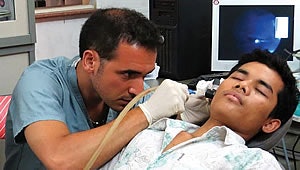 Anthony Del Signore, MD, examines a patient’s ear during the screening clinic.
Anthony Del Signore, MD, examines a patient’s ear during the screening clinic.In July, we joined a medical missions trip led by Global ENT Outreach to Phnom Penh, Cambodia. This was the largest volunteer group to date for our host organization and included the following team members: Shaheen M. Counts, MD; Anthony G. Del Signore, MD; Ian M. Humphreys, DO; Marta Sandoval, MD; Richard Wagner, MD; and Charles Z. Weingarten, MD. We feel the experiences afforded to us by the AAO-HNSF Humanitarian Travel Grant were truly remarkable.
After nearly 20 hours of travel we reached the Cambodian capital of Phnom Penh. Our team of surgeons, nurses, medical students, and public health educators met for the first time in a tiny hotel. Our nationalities, ethnicities, and languages were diverse, but we shared a unified vision of providing otologic care and training to these people in need.
Only 30 years prior, an act of unspeakable genocide targeted the educated and professionals in this area; an entire generation of physicians, health educators, and nurses were eradicated. Today, a fractured healthcare system with poor infrastructure, limited resources, and inexperienced health professionals exists. Rehabilitative efforts, including a nascent otolaryngology residency-training program at the National Hospital Preah Ang Duong, are underway. However, otologic care in particular is poorly understood and under delivered.
The week began with a dedicated otologic clinic to further evaluate patients initially screened by Cambodian otolaryngologists. Many patients traveled great distances from the surrounding countryside to obtain long awaited care. In total, 120 patients were evaluated using either a teaching microscope or video endoscope. Forty-five surgeries were scheduled subsequently for the remainder of the week.
We saw a diverse spectrum of pathology, and patients including congenital malformations, chronic otorrhea, tympanic membrane perforations, cholesteatoma, and otosclerosis. Accordingly, surgical interventions focused on the management of chronic ear disease, with tympanoplasty and tympanomastoidectomy being the most frequent surgical procedures.
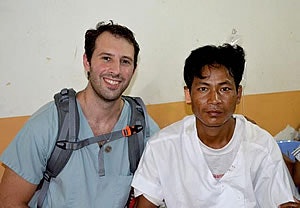 Ian Humphreys, DO, with a post-operative patient.
Ian Humphreys, DO, with a post-operative patient.One goal reigned supreme: to create a dry, safe ear. Given the lack of readily available inhalational anesthesia, the majority of the procedures were performed under local anesthesia and intravenous sedation. All patients were admitted for overnight observation and subsequently discharged home with follow-up care to be provided by the Cambodian otolaryngologists.
Both in the clinic and operating room we had frequent opportunities to teach evaluative and diagnostic strategies, as well as surgical techniques. Despite obvious cultural and language barriers, we focused our collective efforts to achieve our mission. In the end, we provided high quality demonstrative surgery and instruction that serves as a model for continued development of the Cambodian otolaryngology training program.
Not only did we gain an appreciation for the difficulty of providing otologic care in a relatively impoverished part of the world with limited resources and a fractured health system, we also experienced the role of surgeon educator. In the end, our cultural awareness and sense of humanistic professionalism flourished throughout our Cambodian experience.
We are completely indebted to the support provided by the AAO-HNSF Humanitarian Efforts Committee and the Alcon Foundation for this wonderful experience and are confident that it has solidified our commitment to future mission endeavors.
